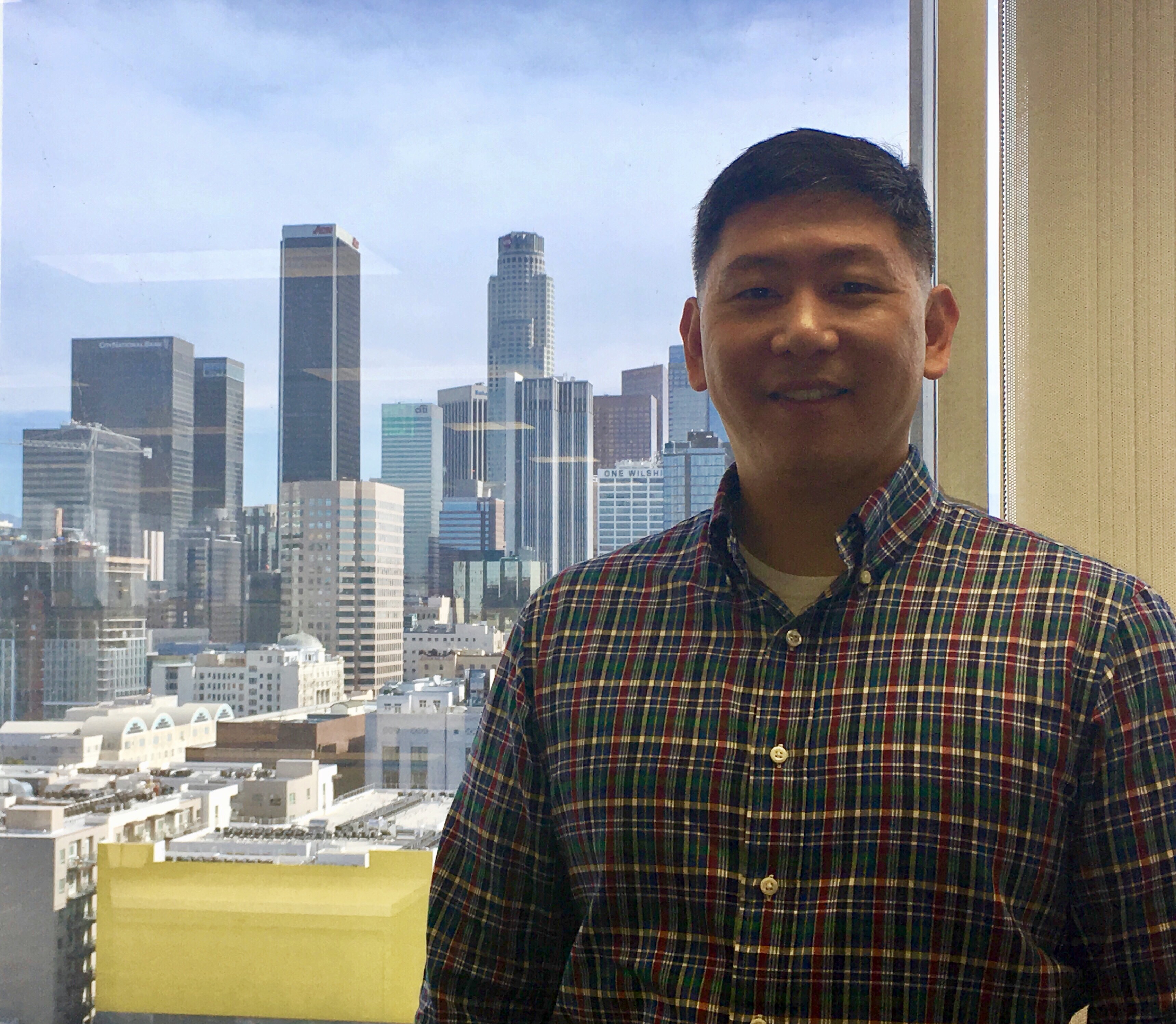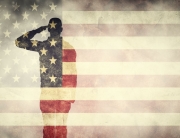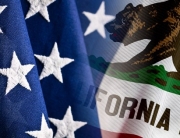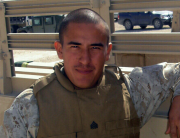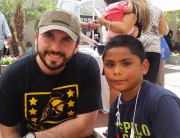Ron Eo is a graduate student at the USC Suzanne Dworak-Peck School of Social Work and COBI Fellow in Social Innovation. He spent a semester placed at the Center for Innovation and Research on Veterans & Military Families full-time. Here, he talks with Nathan Graser, CIR’s community program administrator, about military life, his decision to attend USC, and the importance of innovation for creating change.
Transcript of audio
NG: Can you say your name?
RE: Ronnie Eo
NG: What did you do in the military?
RE: I was a helicopter pilot
NG: And what do you do now?
RE: I’m a change agent. I’m a social work student at USC
NG: So, we wanted to get a chance to know who you were at CIR and a little bit about what brought you here. I know you don’t always feel super comfortable talking about your own story and where you come from. But I just had a couple questions for you. To start, what branch did you serve in, when did you come out, all that stuff.
RE: I served in the Army, from 2004-2015. I did 11.5 years on active duty. I was an instructor pilot for helicopters, specifically one called the OH-58 Delta Kiowa Warrior, it’s an armed reconnaissance helicopter.
NG: Oh, nice. Did you get deployed while you were in?
RE: Yes.
NG: Where’d you go?
RE: I have one combat deployment to Iraq, one combat deployment to Afghanistan, and one operational deployment as a unit, to South Korea.
NG: Okay, you made it past “the hump”. Sometimes in the military they say it’s “the hump” – you made it past that ten-year mark. But then you got out. I’m curious – why did you get out?
RE: Right, so, I made my decision right at “the hump”.
NG: A girl?
RE: It was!
NG: [laughs]
RE: It wasn’t just my now-wife, but a confluence of factors. A major one being that the helicopter that I flew was being retired by the Army.
NG: Oh, so your baby that you had on all these tours was going away
RE: It was. And, I could’ve adapted but, again, not everything was for one reason — meeting my wife, wanting to start a family, everything just happened at the same time so it just made sense for me to get out.
NG: So you decided to move to Los Angeles?
RE: Yes. So, my wife Heather, that’s where she’s from. All her family’s here. My family is a little bit more spread out, so, I wanted us to be in a more stable environment, that family support structure. I’m kind of tired of moving around, I guess. [laughs]
NG: Yeah, tired of moving around. What did you, what was your plan when you got out?
RE: School. I was gonna use my G.I. Bill.
NG: And that’s how you came to USC?
RE: Yes. Just looking on the web pages when I was doing my research as to what schools in the Los Angeles, the Greater Los Angeles Area, at the time on one of the front pages was the military veterans social work program.
NG: And so you said man, I want to join this program. You were a helicopter pilot
RE: I was a helicopter pilot, but I wasn’t in the business of flying helicopters. I was in the business of empowering people. So aviation was kind of, I guess, the means to the work that was truly meaningful to me. I’ll give you a quick example – When, you know, there’s one pilot, his name was Roland, I won’t give you his last name. He was a military transfer, he did about 13 years active duty in the Marine Corps. When he transferred over to the Army to become a helicopter pilot, he didn’t have the greatest of experiences, I’m not sure what those causes were but, he wasn’t meeting his training gates. Well, as you know, the military structure is, if you don’t move up, you move out. And you only have a couple of chances as an officer to get that promotion
NG: So you saw this guy – your pilot – you see this guy come into your unit, still struggling
RE: In a nutshell, he was having troubles. I helped him out, in my position as an instructor pilot. Fast forward, he met his training gates, he met his promotion, and he’s currently flying fixed-wing aircraft continuing his Army career.
NG: Did you want to be a social worker? Earlier you were talking about empowering people, tell me about that.
RE: Yes, I did want to be a social worker. I learned that, after coming to USC, that social work is such a broad spectrum so, my initial vision when I applied was, hey veterans are at the VA so I’ll go to the VA and I’ll find —
NG: Yeah, I hear that all the time. Vets come here, wanna go work at the VA.
RE: Right, but for different reasons, I wanted to work at the VA not necessarily because it’s the federal job continue my federal service hours, I just didn’t know where else veterans would be. It was just kind of intuitive, like okay well if I want to help out other veterans, then they’re gonna be at the VA
NG: So, why not?
RE: My world definitely, you know, I learned a lot more about, you know, where veterans are and where they’re not. And the VA actually plays. It’’s not the whole scene.
NG: Okay, so originally you thought you were going to come to the program and go to the VA. What brought you here, to CIR?
RE: From what I understand, they changed up the way the curriculum was set up, so before it was concentrations and specialties, and now it’s departments. So, three departments: Children, Youth and Families; Adults and Healthy Aging; and then I signed up for the Community Organization Business Innovations. My undergrad was in business economics, so, it led me to choose “COBI”. And then, I find out later on that once you’re in your department, you have to do your internship in a location that is specific to your department, so I couldn’t intern at the VA if I wanted to.
NG: [laugh] And you didn’t know that going in.
RE: I didn’t know that in the beginning, so, apparently —
NG: So your dream was crashed.
RE: The VA is for Adults and Healthy Aging people.
NG: But no community organizers are allowed [laughs].
RE: And then i looked at the Los Angeles Air Force Base, which, by the way, I didn’t know existed. They only take Children, Youth & Family students so, you know, as a “COBI” student I couldn’t win. What I did have available was —
NG: So we were your last choice choice!
RE: Well, no, there was the Cohen Clinic, downstairs, and then here, CIR. I interviewed with both, and both seemed like very exciting opportunities. However the Cohen Clinic had a very specific mission, they were expanding. I as a student wanted to remain in this exploratory mode and continue to learn and expand my horizons. I wasn’t ready to put my head down and work, with the blinders on. I came off of eleven years of active duty. I kept my head down in that work, eleven years straight. I wanted to kinda, you know, keep my eyes out, just kind of look around, and explore, and CIR was the place that afforded that to me. Learn a whole bunch of stuff, meet a whole bunch of new group of people…yeah, it’s, I think, I feel like my imagination is the limit to the opportunities that I get after graduation
NG: So, you and I talk a lot about innovation, and one thing you haven’t mentioned is that you’re an innovation fellow here, at the school, and that’s part of your placement here at CIR. Can you talk a little bit about your thoughts on innovation, what you’ve learned about innovation, and how potentially maybe that even follows some of your work here at CIR.
RE: So I guess, in the time we have, innovation, yeah, so, I actually..
NG: You had an idea
RE: I actually got tired of hearing the word ‘innovation’
NG: [laughs]
RE: Definitely used a lot. I don’t want to say it’s like, overused or abused because you know, that may not be the case but I certainly hear it a lot. But, you know, in my work here, at CIR, I’ve learned a lot about innovation and its breakdown. It was fascinating to discover that there are individuals in this world who have dedicated their careers to the word, or the concept, of innovation. And so, I think it’s more than just ‘flavor of the month’. I think it’s another one of those things that is great, has a time and a place. So, it may not always be the solution, or the answer to, but it’s a good one. If and when appropriate, if it fits.
NG: What is innovation, then, for you? When you signed up to be an innovation fellow, what were you hoping, not just to learn about innovation, but I wonder, what were you thinking, what was your working concept of innovation?
RE: I think, aside, so, without getting into innovation, I think the first step for innovation and also for like any other concept like maintenance, or incremental or ….
NG: What did you say incremental and maintenance in the same sentence? [laughs]
RE: Yeah, so innovation, you’re coming up with new stuff, right? Maintenance is just working what you got, keeping it up. Maintaining…
NG: Okay, okay, I see where you’re going, okay..
RE: So the first step is to do an assessment, it’s just to see what you’re working with and it’s like, do we need something new? Or, is what we have good enough, with a couple of tweaks?
NG: Oh, that’s interesting. So it sounds like you’ve been thinking about innovation that, the assumption might be to innovate, but it sounds like you also feel like there’s a role for maintenance as well.
RE: Yeah, well, here’s the thing also is I think when people hear the word ‘innovate’ they think of like, game-changing disruptions like the iPhone or iPod, things like that. You know, iPod destroyed the Walkman, whathaveyou. But um, or I guess it would be the Discman, Discman destroyed the Walkman [laughs]. But it doesn’t always, we don’t always need to have a disruptive change like that, right. So um… It’s also associated with technology. Right, so, innovation can certainly be in social services. Certainly, yeah, we have problems, and problems that have stuck around for a while, and other problems that just continue to grow, and people look for innovation, something new because the assumption is, we’ve tried everything in the book and nothing’s working. We need something new, we need innovation. But sometimes, I think, sometimes it might be helpful just to look at the problem through a different lens, you know, look for those small little tweaks that might be needed. Disruptive, like, big game changes are great, but yeah, I don’t know, it’s good to temper everything and not go too far off in a deep end. I mean, on anything
NG: So…
RE: Alcohol, video games, do everything in moderation, right? Salt…[laughs]
NG: Yeah, those are three good things. Nice. Well, if there’s one thing that you want people to know about you, what do you want them to know?
RE: So, I like to joke around, but I think being an instructor pilot, being a helicopter pilot kind of gives me the credibility, at least it did in the Army because as some of my students, or some of my, you know, peers have told me that there’s “Ronnie-Ronnie” and “Pilot Ronnie”. And so, they said that I just, it was like flipping a switch, and I went into a different mode, when it came to executing mission, or training, or anything related to the helicopter. But then when we’re just, hanging out, you know, I always like to be in high spirits and joke around and stuff like that.
NG: So it almost sounds like you want people to know that there’s more than just one side of you
RE: Yeah, and, I may not give the greatest– I don’t know what impression I give…
NG: [laughs]
RE: …give you but whatever it is
NG: Non-smiling version, straight to the point…[laughs]
RE: There’s more than one side, I’m not always jokes and I’m not always just business
NG: You’re complicated like the rest of us, that’s good
RE: Yeah…
NG: So..this is Ronnie Eo from USC CIR, if, just as a note here, Ronnie is looking for a job. When do you graduate?
RE: May 12th
NG: May 12, so if you’re looking for qualified veteran candidates, we’ll make sure that his resume and email are available. Anything else you want to say?
RE: I’ll be available after April 29th


